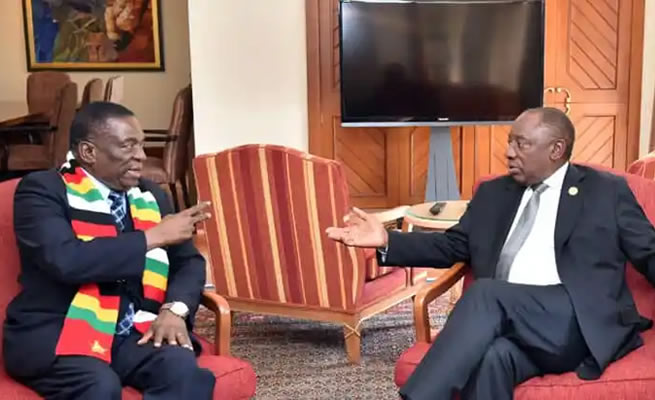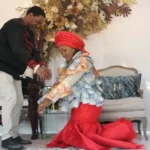The South African government has dismissed calls to move this week’s Southern African Development Community (SADC) summit from Zimbabwe, despite mounting concerns over the country’s human rights record.
The Democratic Alliance (DA), South Africa’s main opposition party, had urged Pretoria to intervene and relocate the summit, citing the recent crackdown on dissent in Zimbabwe.
However, South Africa’s Department of International Relations and Cooperation (DIRCO) has maintained that the summit will proceed as planned in Harare, emphasizing that South Africa has no authority to overrule the SADC’s decision.
“South Africa would have no authority to tell SADC that this summit can’t take place in Harare when Zimbabwe is the incoming chair,” said Clayson Monyela, DIRCO spokesperson.
The DA had highlighted the arrests and alleged torture of several opposition politicians and activists in Zimbabwe, claiming that President Emmerson Mnangagwa is tightening his grip on power to prevent protests during the summit.
Monyela, however, asserted that South Africa believes these issues are best resolved through dialogue.
“South Africa sticks to the principle that these issues are best resolved by the Zimbabweans themselves sitting around a table,” he said. “South Africa stands ready to facilitate such discussions as it has before.”
The government’s stance has been met with criticism from some quarters, who argue that the decision to maintain the summit’s location in Harare sends a dangerous message about the SADC’s commitment to upholding democratic principles and human rights.
Despite the ongoing concerns, the South African government remains steadfast in its commitment to regional solidarity and has confirmed that President Cyril Ramaphosa will be attending the summit in Harare on August 17th.
The upcoming SADC Summit scheduled for this coming weekend in Harare has faced escalating calls to relocate as Zimbabwe’s government continues cracking down on dissent.
Widely known as the DA, South Africa’s largest opposition party has pushed authorities to move the event elsewhere citing a climate unsuitable for hosting under ongoing arrests of prominent activists as evidence.
The appeals followed the detention of human rights defender Namatai Kwekweza, a recipient of the prestigious 2023 Kofi Annan NextGen Democracy Prize, at Robert Mugabe Airport along with three others—Robson Chere, Samuel Gwenzi, and Vusumuzi Moyo—who remain in custody facing disorderly conduct charges.
Additionally, the DA highlighted the jailing of opposition politician Jameson Timba plus 77 activists arrested for allegedly convening an “unauthorized political assembly” and denied bail despite horrific detention conditions.
“Moving the summit is essential to send a strong message against the suppression of democratic rights,” the DA’s statement read.
The DA argues that allowing the summit to proceed under these circumstances would endorse ZANU-PF’s abuse of international law and undermine the principles that SADC was established on. The blue party also claims President Emmerson Mnangagwa’s upcoming SADC Chairmanship is a testament to the continued failure of regional leaders to hold the Zimbabwean government accountable.
“Allowing the summit to proceed under the current circumstances will not only endorse ZANU-PF’s flagrant abuse of international law, but further undermine the principles upon which SADC was established. President Emmerson Mnangagwa’s upcoming SADC Chairmanship is testament to the continued failure of regional leaders to hold these political thugs to account,” the DA in a statement.
However, South Africa’s ruling party, the ANC has dismissed the DA’s call and stated that the summit should proceed as planned in Zimbabwe.
“If there are any issues needing the region’s attention in Zimbabwe, they would be discussed in Zim, not away from it,” ANC spokesperson Zuko Godlimpi told the DA and everyone else who bothered to listen.
Meanwhile, the South African government has also revealed its plans to pursue its case against Israel at the United Nations Security Council, following the apparent lack of impact from the International Court of Justice (ICJ) provisional orders against Israel in Gaza.
The government is considering submitting a resolution calling for an immediate ceasefire in Gaza, and will also be presenting its arguments on the substantive case against Israel in October.
The government has also expressed concern over the recent controversial elections in Venezuela, but has indicated that it will withhold its judgment on the outcome until the Supreme Court has reviewed the results.
The government has also provided an update on efforts to secure the release of two South African engineers, Frik Potgieter and Peter Huxham, who were arrested and convicted of drug trafficking in Equatorial Guinea.
While acknowledging the families’ frustration over the case, DIRCO officials emphasized that Equatorial Guinea is a sovereign state and that the government is working to ensure the two men are treated fairly and have access to consular services.
The government has also reaffirmed its strong diplomatic relations with Nigeria, despite the controversy surrounding the withdrawal of Miss South Africa contestant Chidimma Adetshina from the competition.
Finally, the government has expressed support for the SADC military mission in eastern Democratic Republic of the Congo, noting that the ceasefire negotiated by Angolan President João Lourenço has come into effect.












